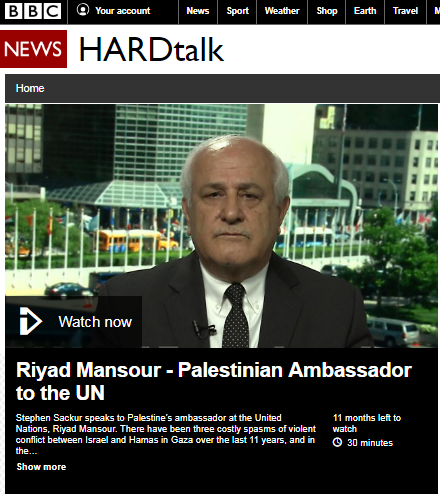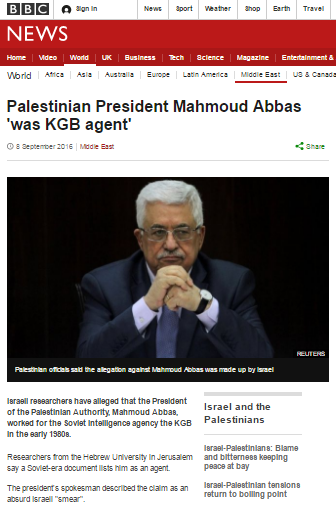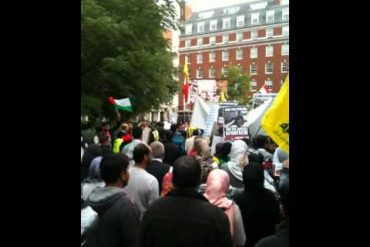On February 6th an article appeared on both the Europe and Middle East pages of the BBC News website under the headline “Turkish FM quits Munich summit over Israeli presence“.
Of the report’s 388 words, only one hundred and three relate to the subject matter presented in that headline.
“Turkey’s foreign minister has withdrawn from a security conference in Munich after Israeli officials were invited.
Mevlut Cavusoglu told reporters he had pulled out after an Israeli delegation was asked to attend a session on the Middle East at the last minute.
He said his decision was not linked to Turkey’s relationship with Germany. […]
Speaking at a news conference in Berlin, Mr Cavusoglu said a collective decision had been taken to withdraw from the joint session.
“I was going to participate in the conference but we decided not to after they included the Israeli representatives in the Middle East session,” he told reporters.”
One hundred and fifty-eight words are devoted to the subject of the May 2010 incident in which Turkish pro-Hamas activists aboard the Mavi Marmara attacked Israeli soldiers attempting to prevent the ship from breaching the naval blockade on the Gaza Strip.
“Ties between Israel and Turkey have been strained since a deadly 2010 Israeli raid on a Turkish ship trying to break Israel’s blockade of Gaza.
Nine Turkish pro-Palestinian activists were killed in clashes with Israeli commandos, who boarded the Mavi Marmara when the ship, which was leading a convoy carrying aid, refused to stop.
Israel has maintained a naval blockade of Gaza since 2007, part of what it says are necessary security measures against the militant Islamist group Hamas in the Gaza Strip. […]
Relations between the Israeli and Turkish governments have been particularly fraught since the deadly raid on 31 May 2010.
Israeli soldiers boarded the Mavi Marmara, which was leading a flotilla containing five other vessels, in international waters, around 130km (80 miles) from Israel’s coast. . Clashes ensued, leaving nine activists dead and 10 soldiers injured.
The then Turkish Prime Minister Recep Tayyip Erdogan said Israel had committed a “bloody massacre” and withdrew his country’s ambassador.”
As has so often been the case in the past, the BBC inaccurately represents the start date of the naval blockade of the Gaza Strip which was actually implemented in January 2009. The use of the phrase “what it says are necessary security measures” disingenuously conceals from audience view the numerous cases in which attempts have been made to smuggle arms to Hamas by sea.
On the Middle East page this report was presented to audiences together with two additional items of recommended reading: “Q&A: Israeli deadly raid on aid flotilla” (also included in the article’s ‘related stories’ sidebar) and “Mavi Marmara: US extracts last-minute Israeli apology” which was previously discussed here.
Clearly, the intention of the writer of this report was to imply that the Turkish Foreign Minister’s withdrawal from the security conference in Munich was directly attributable to the Mavi Marmara incident which took place almost five years ago. But is there actually any evidence to show that is the case? Certainly this report does not include any direct quote from Mevlut Cavusoglu supporting the BBC’s speculation.
Other media outlets also covered the same story. The New York Times did not report a direct quote from the Turkish FM explaining a specific reason for his withdrawal either, but it did provide the following piece of relevant information completely ignored by the BBC:
“A senior Turkish official said his country would still be represented, but by a lower-level diplomat. He spoke on the condition of anonymity under his government’s diplomatic protocols.”
Reuters has the same vague quote from Cavusoglu which appears in the BBC article, as do the Hurriyet Daily News, Ynet and the Jerusalem Post – which also reports the following information:
“Volker Beck, a leading Green Party MP who chairs the Germany-Israel parliamentary group in the Bundestag, sharply criticized the Turkish decision to boycott the Munich conference: “That is an outrageous act.
It is an affront against Israel and an affront against Germany!” He added, “The federal government must condemn the Turkish government. The anti-Israel course of the Turkish government is cause for concern. The cancellation of Turkey’s Foreign Ministry is not an isolated act, rather part of a set of actions. In December, the Turkish prime minister welcomed and celebrated a Hamas leader at the [Turkey’s ruling] AKP party conference,” said Beck.”
Whilst the five year-old Mavi Marmara affair may indeed have contributed to the Turkish FM’s decision to boycott the Munich conference, it is certainly not – as the BBC would have its audiences believe – the entire background to the story.
The Hamas leader invited to the AKP conference last December was Khaled Masha’al, but with the strengthening of relations between Turkey and Hamas in recent years being a topic consistently under-reported by the BBC, audiences are unlikely to be aware of the fact that a number of prominent Hamas operatives – including Saleh al Arouri who took credit on behalf of Hamas for the kidnappings and murders of three Israeli teenagers in June 2014 – are domiciled in Turkey. The Turkish president Erdogan recently claimed that his political rivals work in cooperation with the Israeli intelligence services and the Turkish prime minister even more recently declared that his government “will not succumb to the Jewish lobby…”.
But rather than making the effort to provide its audiences with the full range of information which would enhance their understanding of the context to this particular story, the BBC obviously thought it could make do with simply dusting off its old – and in parts still inaccurate – reports relating to the five year-old Mavi Marmara incident.




